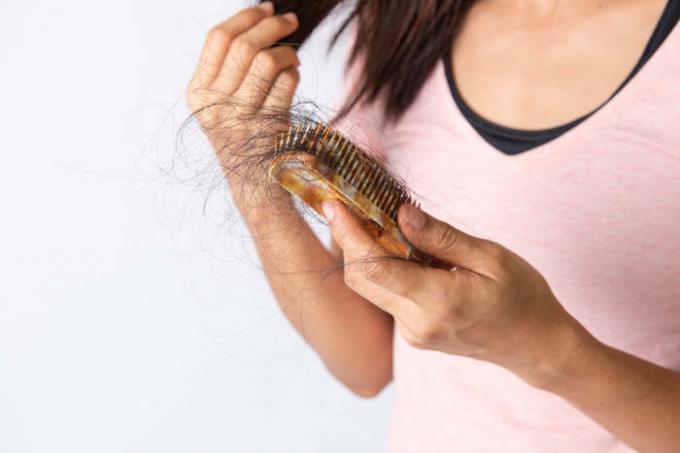Hair loss has become one of the hallmarks of postcoid syndrome. After illness, hair falls out in almost everyone. Why is this happening and how you can solve this problem
Coronavirus hits all body systems, and hair is no exception. Moreover, the more aggressive the strain of the disease, the more damaged the hair follicles. Trichologists say that in the last wave of diseases that took place across the country in March-April, the number of applications with the problem of hair loss has almost doubled. Is hair loss really postcoid and what is the real cause of the problem? An infectious disease doctor told about this on his Facebook page. Evgeny Igorovich
Why does hair fall out after covid?

Hair loss after coronavirus due to stress and drugs / istockphoto.com
Trichologists say that the "hair fall" after the coronavirus does not begin immediately. Usually complaints come in 3-4 months after the illness. A similar picture is observed with hair during pregnancy: As a rule, mothers complain about their loss 3-6 months after the birth of the child. This prompted scientists to believe that baldness after covid occurs due to stress and depletion of the body's resources. However, besides this, there are several other important factors.
“Firstly, an infectious disease itself can indeed cause temporary damage to the hair follicle, this is sometimes observed in other diseases, - notes Eugene Igorovich. “As for covid, there is a version that it is a violation of microcirculation, which leads to a deterioration in the trophism (nutrition) of the follicle, and, accordingly, to premature hair loss.”
In addition, taking medications plays a significant role here. Severe covid is treated with anticoagulants and systemic steroid hormones. “The effect of systemic hormonal drugs definitely does not go unnoticed by the body,” emphasizes Evgeny Igorovich.
A separate group in the treatment of coronavirus is antibiotics, which our patients like to take "for safety reasons." “One, two, and sometimes three powerful antibiotics - this is the usual, unfortunately, set for the 'prevention' of severe covid. In addition to the risk of developing antibiotic resistance in the future, people are paying the price for the irrational use of antibiotics now. This strongly poisons the body and affects, among other things, hair growth, ”the expert warns.
How to stop baldness after covid

Avoid blow-drying and "heavy" styling products / istockphoto.com
First of all, during illness, you should not engage in self-prescription and take drugs that your doctor has not prescribed for you. Especially when it comes to antibiotics, which makes sense to prescribe only for a bacterial infection. With covid, no “prevention” of pneumonia works, Yevgeny Igorovich emphasizes. Also, there is no need to panic and wait for total baldness: according to the observations of trichologists, excessive hair loss after coronavirus is temporary and stops by itself after 2-3 months.
It is clear that during this time the hair can seriously thin out, so consultation with a specialist in this case will not hurt. However, there are basic rules that will help you, if not stop the loss, then at least reduce its intensity:
- give up aggressive procedures (drying with a hairdryer, flattening with an iron or curling with a curling iron)
- stop using styling products (mousses, foams, gels, hairspray)
- wash your hair properly and do not forget to apply hair conditioner, it smoothes the hair and makes it less brittle
- drink a course of B vitamins, which are very important for hair growth
- check the hemoglobin level (after coronavirus it is often lowered) and, if necessary, correct it with food or iron supplements
- do not neglect restorative procedures: homemade hair masks based on natural ingredients nourish follicles and restore hair structure
- mesotherapy shows good results from salon procedures, but it is advisable to do it no earlier than three months after recovery from coronavirus
You will also be interested to read:
What vitamins do you lack if your hair is falling out?
Why our hair actually falls out: myths to forget


